Campus/People
-
 Students' Continued Gratitude Extends to Their Spouses
Here is a story of a group of KAIST graduates who still cherish the memory of their professor who passed away in 2003.
They are former students from the Department of Materials Science and Engineering and SDV Lab and their spouses. They created a group, called ‘Chun-sa-heoi’ meaning members who love Dr. Soung-Soon Chun. They reunite every February 26, the date that Dr. Chun passed away.
Chun-sa-heoi is comprised of twelve former students who are now professors, board members of major companies, and an attorney. From his first graduate, Professor Jae Gon Kim at Hanyang University to the most recent graduate, Attorney Jaehwan Kim, Chun-sa-heoi is marking 40 years of their bond.
Dr. Chun was teaching at the University of Utah when he received a call from the Korean government asking him to join KAIST in 1972 as a visiting professor.
He first introduced and established the Department of Materials Engineering, which was considered to be an advanced field at that time. During 30 years of dedication in this field, he fostered 48 Masters and 26 PhD graduates.
Professor Chul Soon Park from the School of Electrical Engineering is one of the former students of Dr. Chun. He explained, “Dr. Chun always cared about his students and guided them in better directions even after they graduated. My gratitude towards him still stays deep in my heart, so I keep maintaining the relationship with him.”
Mrs. Bok Yeon Choi, the spouse of KOREATECH Professor Sang-Ho Kim, first met Dr. Chun and his wife, Myung-Ja Chun in 1987 when she married her husband, who was enrolled in the graduate program at that time. “The Chuns showed affection to not only Dr. Chun’s students but also their families. They took care of us like a family,” she recalled.
Although Dr. Chun passed away in 2003, they continue to pay visits to Mrs. Chun, and they naturally organized this group, expressing gratitude to the Chuns. And their reunions keep on going even after Mrs. Chun moved to Los Angeles where her children are residing. Whenever the former students have a business trip to the U.S, they do not forget to visit Mrs. Chun.
But this year was somewhat more special for Mrs Chun and Chun-sa-heoi. In April, twelve spouses from Chun-sa-heoi invited Mrs. Chun to Hawaii to celebrate her 80th birthday. Mrs. Chun means a lot to the spouses because she has played the role of supporter to them. When they needed advice, she always answered sincerely and encouraged them.
There are numerous relationships among students and professors over the history of KAIST; however, the story of the Chuns and Chun-sa-heoi is very special because their relationship extends to their spouses, beyond the student-professor relationship.
This photo was taken in last April when Chun-sa-heoi celebrated the 80th birthday of Mrs. Chun in Hawaii.
? Who is Dr. Chun?
(Dr. Soung-Soon Chun)
Dr. Chun returned to Korea from the United States in 1972 following a call from the Korean government. At that time, the government policy was to bring back prominent scientists from abroad to develop national science and technology. From the time of KAIST’s foundation, he dedicated himself as a professor. He established the Department of Materials Engineering, where he fostered students and made significant academic contributions in his field.
While holding a position as a professor at the University of Utah, he developed a chemical vapor deposition method with tungsten and applied this method to cutting tools, making a contribution to the economic development of Korea.
When government-funded institutes, including KAIST, faced difficulties due to early retirements and tax credits being cut off, he was appointed as the vice president of KAIST and ardently proposed ways to promote the institute. During his term as vice president and president, he contributed to making KAIST a global research-centered educational institute. Before he passed away at the age of 69 in 2003, he held the position of president of the Daejeon National University of Technology and the Presidential Advisory Council on Science and Technology.
2018.07.13 View 7247
Students' Continued Gratitude Extends to Their Spouses
Here is a story of a group of KAIST graduates who still cherish the memory of their professor who passed away in 2003.
They are former students from the Department of Materials Science and Engineering and SDV Lab and their spouses. They created a group, called ‘Chun-sa-heoi’ meaning members who love Dr. Soung-Soon Chun. They reunite every February 26, the date that Dr. Chun passed away.
Chun-sa-heoi is comprised of twelve former students who are now professors, board members of major companies, and an attorney. From his first graduate, Professor Jae Gon Kim at Hanyang University to the most recent graduate, Attorney Jaehwan Kim, Chun-sa-heoi is marking 40 years of their bond.
Dr. Chun was teaching at the University of Utah when he received a call from the Korean government asking him to join KAIST in 1972 as a visiting professor.
He first introduced and established the Department of Materials Engineering, which was considered to be an advanced field at that time. During 30 years of dedication in this field, he fostered 48 Masters and 26 PhD graduates.
Professor Chul Soon Park from the School of Electrical Engineering is one of the former students of Dr. Chun. He explained, “Dr. Chun always cared about his students and guided them in better directions even after they graduated. My gratitude towards him still stays deep in my heart, so I keep maintaining the relationship with him.”
Mrs. Bok Yeon Choi, the spouse of KOREATECH Professor Sang-Ho Kim, first met Dr. Chun and his wife, Myung-Ja Chun in 1987 when she married her husband, who was enrolled in the graduate program at that time. “The Chuns showed affection to not only Dr. Chun’s students but also their families. They took care of us like a family,” she recalled.
Although Dr. Chun passed away in 2003, they continue to pay visits to Mrs. Chun, and they naturally organized this group, expressing gratitude to the Chuns. And their reunions keep on going even after Mrs. Chun moved to Los Angeles where her children are residing. Whenever the former students have a business trip to the U.S, they do not forget to visit Mrs. Chun.
But this year was somewhat more special for Mrs Chun and Chun-sa-heoi. In April, twelve spouses from Chun-sa-heoi invited Mrs. Chun to Hawaii to celebrate her 80th birthday. Mrs. Chun means a lot to the spouses because she has played the role of supporter to them. When they needed advice, she always answered sincerely and encouraged them.
There are numerous relationships among students and professors over the history of KAIST; however, the story of the Chuns and Chun-sa-heoi is very special because their relationship extends to their spouses, beyond the student-professor relationship.
This photo was taken in last April when Chun-sa-heoi celebrated the 80th birthday of Mrs. Chun in Hawaii.
? Who is Dr. Chun?
(Dr. Soung-Soon Chun)
Dr. Chun returned to Korea from the United States in 1972 following a call from the Korean government. At that time, the government policy was to bring back prominent scientists from abroad to develop national science and technology. From the time of KAIST’s foundation, he dedicated himself as a professor. He established the Department of Materials Engineering, where he fostered students and made significant academic contributions in his field.
While holding a position as a professor at the University of Utah, he developed a chemical vapor deposition method with tungsten and applied this method to cutting tools, making a contribution to the economic development of Korea.
When government-funded institutes, including KAIST, faced difficulties due to early retirements and tax credits being cut off, he was appointed as the vice president of KAIST and ardently proposed ways to promote the institute. During his term as vice president and president, he contributed to making KAIST a global research-centered educational institute. Before he passed away at the age of 69 in 2003, he held the position of president of the Daejeon National University of Technology and the Presidential Advisory Council on Science and Technology.
2018.07.13 View 7247 -
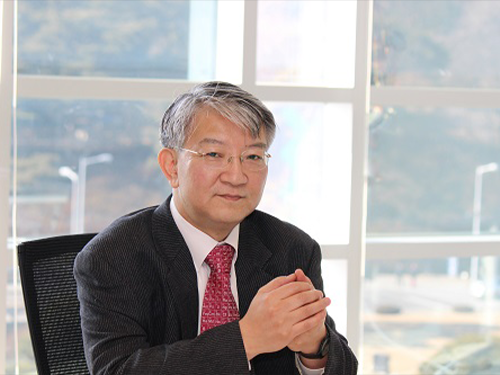 Distinguished Professor Lee Receives 2018 George Washington Carver Award
(Distinguished Professor Lee)
Distinguished Professor Sang Yup Lee from the Department of Chemical and Biomolecular Engineering will become the 11th recipient of the George Washington Carver Award. The award ceremony will be held during the 2018 Biotechnology Innovation Organization (BIO) World Congress on Industrial Biotechnology from July 16 through 19 at the Pennsylvania Convention Center in Philadelphia.
The annual Carver award recognizes an individual who has made a significant contribution to building the bio-based economy by applying industrial biotechnology to create environmentally sustainable products. It serves as a lasting memorial to the original vision of George Washington Carver who, over a century ago, pioneered bio-based products, materials, and energy derived from renewable agricultural feedstock. Previous recipients include the founder and CEO of POET Jeff Broin, the CEO of DuPont Ellen Kullman, and Professor Gregory Stephanopoulos at MIT.
Professor Lee is a pioneering scholar of systems metabolic engineering, leveraging technology to develop microbial bioprocesses for the sustainable and environment-friendly production of chemicals, fuels, and materials from non-food renewable biomass. He also serves as the dean of the multi-and interdisciplinary research center hub, KAIST Institute.Through his work, Professor Lee has garnered countless achievements, including being one of only 13 people in the world elected as a foreign member of both the National Academy of Sciences USA and the National Academy of Engineering USA.
He has actively promoted the importance of industrial biotechnology through engagement with the public, policymakers, and decision makers around the world. He currently serves as the co-chairman of the Global Future Council on Biotechnology for the World Economic Forum and served as the Chairman of the Emerging Technologies Council and Biotechnology Council for the World Economic Forum.
Upon the award announcement, Dr. Brent Erickson, executive vice president of BIO’s Industrial & Environmental Section lauded Professor Lee’s achievement, saying “Dr. Lee has advanced the bio-based economy by developing innovative products and processes that are sustainable and environmentally friendly. In doing so, he has become a leader in advocating on the importance of industrial biotechnology. His contributions to the advancement of the industry are a continuation of the legacy left behind by George Washington Carver.”
Professor Lee thanked his research team who has worked together for the past few decades, adding, “Industrial biotechnology is becoming increasingly important to help achieve the UN’s Sustainable Development Goals. We should continue to work together to advance the field and establish a solid foundation for the sustainable future.”
The George Washington Carver Award is sponsored by the Iowa Biotechnology Association. Joe Hrdlicka, executive director of the Iowa Biotechnology Association, said, “Dr. Sang Yup Lee’s significant contributions to the advancement of industrial biotechnology make him the perfect recipient for the George Washington Carver Award. Having published more than 575 peer-reviewed papers, contributed to 82 books, and holding 636 patents, the culmination of Dr. Lee’s work has led to the establishment of sustainable systems for bio-based production of chemicals, fuels, and materials, thus reducing environmental impact and improving quality of life for all.”
2018.07.12 View 12551
Distinguished Professor Lee Receives 2018 George Washington Carver Award
(Distinguished Professor Lee)
Distinguished Professor Sang Yup Lee from the Department of Chemical and Biomolecular Engineering will become the 11th recipient of the George Washington Carver Award. The award ceremony will be held during the 2018 Biotechnology Innovation Organization (BIO) World Congress on Industrial Biotechnology from July 16 through 19 at the Pennsylvania Convention Center in Philadelphia.
The annual Carver award recognizes an individual who has made a significant contribution to building the bio-based economy by applying industrial biotechnology to create environmentally sustainable products. It serves as a lasting memorial to the original vision of George Washington Carver who, over a century ago, pioneered bio-based products, materials, and energy derived from renewable agricultural feedstock. Previous recipients include the founder and CEO of POET Jeff Broin, the CEO of DuPont Ellen Kullman, and Professor Gregory Stephanopoulos at MIT.
Professor Lee is a pioneering scholar of systems metabolic engineering, leveraging technology to develop microbial bioprocesses for the sustainable and environment-friendly production of chemicals, fuels, and materials from non-food renewable biomass. He also serves as the dean of the multi-and interdisciplinary research center hub, KAIST Institute.Through his work, Professor Lee has garnered countless achievements, including being one of only 13 people in the world elected as a foreign member of both the National Academy of Sciences USA and the National Academy of Engineering USA.
He has actively promoted the importance of industrial biotechnology through engagement with the public, policymakers, and decision makers around the world. He currently serves as the co-chairman of the Global Future Council on Biotechnology for the World Economic Forum and served as the Chairman of the Emerging Technologies Council and Biotechnology Council for the World Economic Forum.
Upon the award announcement, Dr. Brent Erickson, executive vice president of BIO’s Industrial & Environmental Section lauded Professor Lee’s achievement, saying “Dr. Lee has advanced the bio-based economy by developing innovative products and processes that are sustainable and environmentally friendly. In doing so, he has become a leader in advocating on the importance of industrial biotechnology. His contributions to the advancement of the industry are a continuation of the legacy left behind by George Washington Carver.”
Professor Lee thanked his research team who has worked together for the past few decades, adding, “Industrial biotechnology is becoming increasingly important to help achieve the UN’s Sustainable Development Goals. We should continue to work together to advance the field and establish a solid foundation for the sustainable future.”
The George Washington Carver Award is sponsored by the Iowa Biotechnology Association. Joe Hrdlicka, executive director of the Iowa Biotechnology Association, said, “Dr. Sang Yup Lee’s significant contributions to the advancement of industrial biotechnology make him the perfect recipient for the George Washington Carver Award. Having published more than 575 peer-reviewed papers, contributed to 82 books, and holding 636 patents, the culmination of Dr. Lee’s work has led to the establishment of sustainable systems for bio-based production of chemicals, fuels, and materials, thus reducing environmental impact and improving quality of life for all.”
2018.07.12 View 12551 -
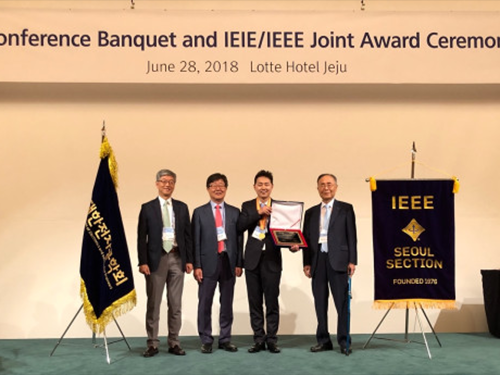 Professor Suh Chosen for IT Young Engineer Award
(The ceremony photo of Professor Changho Suh)
Professor Changho Suh from the School of Electrical Engineering received the IT Young Engineer Award on June 28. This award is hosted by the Institute of Electrical and Electronics Engineers (IEEE) and the Institute of Electrical and Information Engineers (IEIE) and funded by the Haedong Science Foundation.
The IT Young Engineer Award is given to researchers under the age of 40 in Korea. The selection criteria include the researches’ technical practicability, their social and environmental contributions, and their creativity.
Professor Suh has shown outstanding academic performance in the field of telecommunications, distributed storage, and artificial intelligence and he has also contributed to technological commercialization. He published 23 papers in SCI journals and ten papers at top-level international conferences including the Conference on Neural Information Processing Systems and the International Conference on Machine Learning. His papers were cited more than 4,100 times. He has also achieved 30 international patent registrations.
Currently, he is developing an autonomous driving system using an AI-tutor and deep learning technology.
Professor Suh said, “It is my great honor to receive the IT Young Engineer Award. I strive to continue guiding students and carrying out research in order to make a contribution to the fields of IT and AI.”
2018.07.04 View 10274
Professor Suh Chosen for IT Young Engineer Award
(The ceremony photo of Professor Changho Suh)
Professor Changho Suh from the School of Electrical Engineering received the IT Young Engineer Award on June 28. This award is hosted by the Institute of Electrical and Electronics Engineers (IEEE) and the Institute of Electrical and Information Engineers (IEIE) and funded by the Haedong Science Foundation.
The IT Young Engineer Award is given to researchers under the age of 40 in Korea. The selection criteria include the researches’ technical practicability, their social and environmental contributions, and their creativity.
Professor Suh has shown outstanding academic performance in the field of telecommunications, distributed storage, and artificial intelligence and he has also contributed to technological commercialization. He published 23 papers in SCI journals and ten papers at top-level international conferences including the Conference on Neural Information Processing Systems and the International Conference on Machine Learning. His papers were cited more than 4,100 times. He has also achieved 30 international patent registrations.
Currently, he is developing an autonomous driving system using an AI-tutor and deep learning technology.
Professor Suh said, “It is my great honor to receive the IT Young Engineer Award. I strive to continue guiding students and carrying out research in order to make a contribution to the fields of IT and AI.”
2018.07.04 View 10274 -
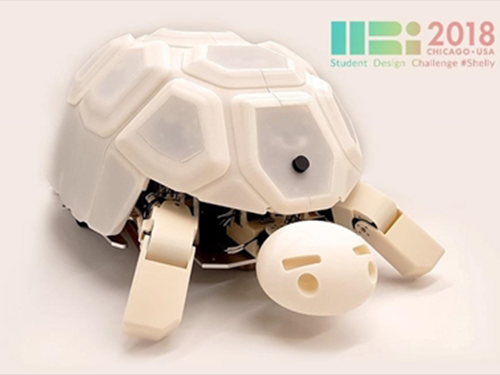 KAIST Student Wins HRI Student Design Competition
(From left: Jason Jangho Choi, Hyunjin Ku and Wonkyung Do)
Hyunjin Ku from the Department of Mechanical Engineering won the first prize at the Student Design Competition of Human-Robot-Interaction (HRI) 2018 which was held in Chicago.
Ku teamed up with undergrad students from Seoul National University (Jason Jangho Choi, Soomin Lee, Sunho Jang, and Wonkyung Do) and submitted Shelly, a tortoise-like robot for one-to-many interactions with children.
Figure 1. Shelly, a tortoise-like robot for one-to-many interactions with children
In the Student Design Competition of the HRI, students from around the globe can submit designs for their interactive robotic objects. The competition focused on human-agent interactions and practical applications.
Ku conducted the research while doing an internship at NAVER Labs. Her research on learning robot abuse with Shelly was published in IEEE Spectrum.
[YTN Science]
https://www.youtube.com/watch?v=n5KVwgBk0wk
[HRI 2018 Website]
http://humanrobotinteraction.org/2018/sdc/
[IEEE Spectrum]
https://spectrum.ieee.org/automaton/robotics/robotics-hardware/shelly-robotic-tortoise-helps-kids-learn-that-robot-abuse-is-a-bad-thing
2018.07.02 View 8718
KAIST Student Wins HRI Student Design Competition
(From left: Jason Jangho Choi, Hyunjin Ku and Wonkyung Do)
Hyunjin Ku from the Department of Mechanical Engineering won the first prize at the Student Design Competition of Human-Robot-Interaction (HRI) 2018 which was held in Chicago.
Ku teamed up with undergrad students from Seoul National University (Jason Jangho Choi, Soomin Lee, Sunho Jang, and Wonkyung Do) and submitted Shelly, a tortoise-like robot for one-to-many interactions with children.
Figure 1. Shelly, a tortoise-like robot for one-to-many interactions with children
In the Student Design Competition of the HRI, students from around the globe can submit designs for their interactive robotic objects. The competition focused on human-agent interactions and practical applications.
Ku conducted the research while doing an internship at NAVER Labs. Her research on learning robot abuse with Shelly was published in IEEE Spectrum.
[YTN Science]
https://www.youtube.com/watch?v=n5KVwgBk0wk
[HRI 2018 Website]
http://humanrobotinteraction.org/2018/sdc/
[IEEE Spectrum]
https://spectrum.ieee.org/automaton/robotics/robotics-hardware/shelly-robotic-tortoise-helps-kids-learn-that-robot-abuse-is-a-bad-thing
2018.07.02 View 8718 -
 ICT Volunteer Corps Off to Africa
A volunteer corps made up of students will take part in ICT education services in Ethiopia, Tanzania, and Uganda. KAIST students have been volunteering with the ICT education program in Africa since 2015.
The volunteer corps will be made up of 51 students from 13 teams and will be conducting services for a month through the end of July at Addis Ababa Institute of Technology (AAiT) in Ethiopia, Nelson Mandela African Institute of Science and Technology (NM-AIST) and Star High School in Tanzania, and IT Education Center in Uganda.
In Tanzania, KAIST students teamed up with NM-AIST students to carry out appropriate technology programs applied with Arduino kits. They plan to use scientific and engineering approaches to address local residents’ living challenges such as developing agricultural water suppliers using sensors measuring water in the soil and oxygen suppliers in the reservoir.
Meanwhile, in Ethiopia and Uganda, student volunteers will be involved in various ICT educational programs for local students. The volunteering corps will also introduce cultural programs including K-Pop dancing for young students there. They will also engage in sports and art classes for students at orphanages in the region.
President Sung-Chul Shin encouraged volunteers at the kick-off ceremony saying, “KAIST students should keep always humility, warmth, and tolerance in mind. I believe our students will exert leadership out there along with knowledge as well as wisdom.”
2018.07.02 View 7407
ICT Volunteer Corps Off to Africa
A volunteer corps made up of students will take part in ICT education services in Ethiopia, Tanzania, and Uganda. KAIST students have been volunteering with the ICT education program in Africa since 2015.
The volunteer corps will be made up of 51 students from 13 teams and will be conducting services for a month through the end of July at Addis Ababa Institute of Technology (AAiT) in Ethiopia, Nelson Mandela African Institute of Science and Technology (NM-AIST) and Star High School in Tanzania, and IT Education Center in Uganda.
In Tanzania, KAIST students teamed up with NM-AIST students to carry out appropriate technology programs applied with Arduino kits. They plan to use scientific and engineering approaches to address local residents’ living challenges such as developing agricultural water suppliers using sensors measuring water in the soil and oxygen suppliers in the reservoir.
Meanwhile, in Ethiopia and Uganda, student volunteers will be involved in various ICT educational programs for local students. The volunteering corps will also introduce cultural programs including K-Pop dancing for young students there. They will also engage in sports and art classes for students at orphanages in the region.
President Sung-Chul Shin encouraged volunteers at the kick-off ceremony saying, “KAIST students should keep always humility, warmth, and tolerance in mind. I believe our students will exert leadership out there along with knowledge as well as wisdom.”
2018.07.02 View 7407 -
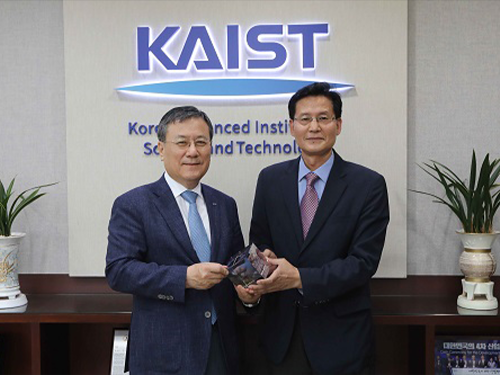 AST Holdings Makes a Donation to KAIST
(KAIST President Sung-Chul Shin and the CEO of AST Holdings, Haegyoo Seo)
KAIST President Sung-Chul Shin and the CEO of AST Holdings, Haegyoo Seo, agreed to a partnership on June 27 at the main campus of KAIST.
AST Holdings donated one hundred million KRW to the school for fostering experts in the field of augmented reality (AR). The fund will also go to joint research on AR technologies required smart cities.
AST Holdings, established in 1997, specializes in developing VR/AR contents. It has collaborated with Samsung Electronics and KIA Motors to produce various digital contents and develop solutions using VR/AR.
Research and development carried out by the Augmented Reality Research Center (ARRC) of KAIST aims to foster talented manpower and has accumulated crucial components of technology for contributing to research dissemination.
In particular, the ARRC established an industrial, academic, and research partnership that has suggested a new standard for industrial-academic joint research. Under this agreement, an industry assigns its staff to the research center to obtain new technical capabilities while the center strengthens the technological application of a study based on the industrial needs.
Through the partnership funds, the center can provide a stable research environment for young researchers and recruit talented manpower from around the world. The center has the potential to become a new model of industrial-academic research platforms that will take a leading role in the field of VR/AR.
CEO Seo said, “I would like to take the lead in research on VR/AR-based futuristic city platforms through this partnership with KAIST ARRC and the industrial-academic research program. I hope that this partnership between our company and KAIST will create synergy and secure crucial research, manpower, and basic technology according to our company’s needs.
President Shin added, “KAIST will pursue creating an exemplary case of industrial-academic cooperation with outstanding national and international manpower.”
2018.07.02 View 4910
AST Holdings Makes a Donation to KAIST
(KAIST President Sung-Chul Shin and the CEO of AST Holdings, Haegyoo Seo)
KAIST President Sung-Chul Shin and the CEO of AST Holdings, Haegyoo Seo, agreed to a partnership on June 27 at the main campus of KAIST.
AST Holdings donated one hundred million KRW to the school for fostering experts in the field of augmented reality (AR). The fund will also go to joint research on AR technologies required smart cities.
AST Holdings, established in 1997, specializes in developing VR/AR contents. It has collaborated with Samsung Electronics and KIA Motors to produce various digital contents and develop solutions using VR/AR.
Research and development carried out by the Augmented Reality Research Center (ARRC) of KAIST aims to foster talented manpower and has accumulated crucial components of technology for contributing to research dissemination.
In particular, the ARRC established an industrial, academic, and research partnership that has suggested a new standard for industrial-academic joint research. Under this agreement, an industry assigns its staff to the research center to obtain new technical capabilities while the center strengthens the technological application of a study based on the industrial needs.
Through the partnership funds, the center can provide a stable research environment for young researchers and recruit talented manpower from around the world. The center has the potential to become a new model of industrial-academic research platforms that will take a leading role in the field of VR/AR.
CEO Seo said, “I would like to take the lead in research on VR/AR-based futuristic city platforms through this partnership with KAIST ARRC and the industrial-academic research program. I hope that this partnership between our company and KAIST will create synergy and secure crucial research, manpower, and basic technology according to our company’s needs.
President Shin added, “KAIST will pursue creating an exemplary case of industrial-academic cooperation with outstanding national and international manpower.”
2018.07.02 View 4910 -
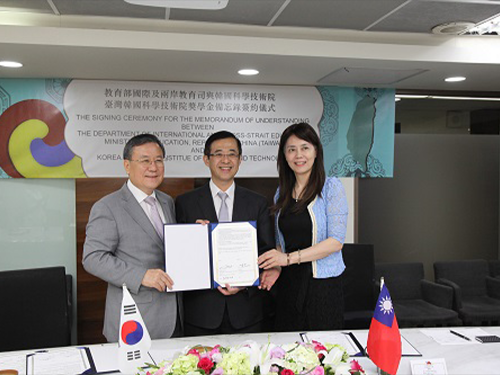 KAIST Partners with Taiwan for PhD Scholarship Program
(President Shin, Taiwanese Acting Minister of Education Yao, Deputy Director General Chang at the Ministry of Education pose after signing the MOU.(from left))
President Sung-Chul Shin signed an MOU with the Ministry of Education in Taiwan for the Taiwanese PhD scholarship program. The signing was made between President Shin and Dr. Yao Leehter, acting Minister of Education in Taiwan, on June 27.
The Taiwanese Ministry of Education is signing MOUs with prestigious universities around the world to encourage its students to pursue study abroad opportunities at top schools. According to the MOU, Taiwanese PhD candidates will be able to use KAIST scholarships for their tuition fees, while the Taiwanese government will provide a stipend and living costs for four years from next September.
KAIST became the 14th university to sign this MOU, joining a group of top universities that includes University of Cambridge, Oxford University, California Institute of Technology, and Columbia University in the US. KAIST is the first institution in Asia to sign the MOU.
Acting Minister Yao said, “KAIST has emerged as a world leading university in less than five decades since its foundation. This remarkable growth led us to partner with KAIST. We hope this will serve as an opportunity to further our partnership in research collaboration as well as students exchanges.”
President Shin appreciated the Taiwanese government’s recognition of KAIST’s global reputation. He said, “We will closely collaborate with the Taiwan government and its universities for transforming educational opportunities to better respond to the Fourth Industrial Revolution.
2018.06.27 View 6179
KAIST Partners with Taiwan for PhD Scholarship Program
(President Shin, Taiwanese Acting Minister of Education Yao, Deputy Director General Chang at the Ministry of Education pose after signing the MOU.(from left))
President Sung-Chul Shin signed an MOU with the Ministry of Education in Taiwan for the Taiwanese PhD scholarship program. The signing was made between President Shin and Dr. Yao Leehter, acting Minister of Education in Taiwan, on June 27.
The Taiwanese Ministry of Education is signing MOUs with prestigious universities around the world to encourage its students to pursue study abroad opportunities at top schools. According to the MOU, Taiwanese PhD candidates will be able to use KAIST scholarships for their tuition fees, while the Taiwanese government will provide a stipend and living costs for four years from next September.
KAIST became the 14th university to sign this MOU, joining a group of top universities that includes University of Cambridge, Oxford University, California Institute of Technology, and Columbia University in the US. KAIST is the first institution in Asia to sign the MOU.
Acting Minister Yao said, “KAIST has emerged as a world leading university in less than five decades since its foundation. This remarkable growth led us to partner with KAIST. We hope this will serve as an opportunity to further our partnership in research collaboration as well as students exchanges.”
President Shin appreciated the Taiwanese government’s recognition of KAIST’s global reputation. He said, “We will closely collaborate with the Taiwan government and its universities for transforming educational opportunities to better respond to the Fourth Industrial Revolution.
2018.06.27 View 6179 -
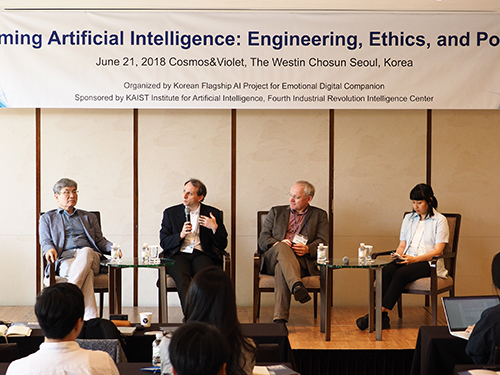 Taming AI: Engineering, Ethics, and Policy
(Professor Lee, Professor Koene, Professor Walsh, and Professor Ema (from left))
Can AI-powered robotics could be adequate companions for humans? Will the good faith of users and developers work for helping AI-powered robots become the new tribe of the digital future?
AI’s efficiency is creating new socio-economic opportunities in the global market. Despite the opportunities, challenges still remain. It is said that efficiency-enforcing algorithms through deep learning will take an eventual toll on human dignity and safety, bringing out the disastrous fiascos featured in the Terminator movies.
A research group at the Korean Flagship AI Project for Emotional Digital Companionship at KAIST Institute for AI (KI4AI) and the Fourth Industrial Intelligence Center at KAIST Institute co-hosted a seminar, “Taming AI: Engineering, Ethics, and Policy” last week to discuss ways to better employ AI technologies in ways that upholds human values.
The KI4AI has been conducting this flagship project from the end of 2016 with the support of the Ministry of Science and ICT.
The seminar brought together three speakers from Australia, Japan, and the UK to better fathom the implications of the new technology emergence from the ethical perspectives of engineering and discuss policymaking for the responsible usage of technology.
Professor Toby Walsh, an anti-autonomous weapon activist from New South Wales University in Australia continued to argue the possible risk that AI poses to malfunction. He said that an independent ethics committee or group usually monitors academic institutions’ research activities in order to avoid any possible mishaps.
However, he said there is no independent group or committee monitoring the nature of corporations’ engagement of such technologies, while its possible threats against humanity are alleged to be growing. He mentioned that Google’s and Amazon’s information collecting also pose a potent threat. He said that ethical standards similar to academic research integrity should be established to avoid the possible restricting of the dignity of humans and mass destruction. He hoped that KAIST and Google would play a leading role in establishing an international norm toward this compelling issue.
Professor Arisa Ema from the University of Tokyo provided very compelling arguments for thinking about the duplicity of technology and how technology should serve the public interest without any bias against gender, race, and social stratum. She pointed out the information dominated by several Western corporations like Google. She said that such algorithms for deep learning of data provided by several Western corporations will create very biased information, only applicable to limited races and classes.
Meanwhile, Professor Ansgar Koene from the University of Nottingham presented the IEEE’s global initiative on the ethics of autonomous and intelligence systems. He shared the cases of industry standards and ethically-aligned designs made by the IEEE Standards Association. He said more than 250 global cross-disciplinary thought leaders from around the world joined to develop ethical guidelines called Ethically Aligned Design (EAD) V2. EAD V2 includes methodologies to guide ethical research and design, embedding values into autonomous intelligence systems among others. For the next step beyond EAD V2, the association is now working for IEEE P70xx Standards Projects, detailing more technical approaches.
Professor Soo Young Lee at KAIST argued that the eventual goal of complete AI is to have human-like emotions, calling it a new paradigm for the relationship between humans and AI-robots. According to Professor Lee, AI-powered robots will serve as a good companion for humans. “Especially in aging societies affecting the globe, this will be a very viable and practical option,” he said.
He pointed out, “Kids learn from parents’ morality and social behavior. Users should have AI-robots learn morality as well. Their relationships should be based on good faith and trust, no longer that of master and slave. He said that liability issues for any mishap will need to be discussed further, but basically each user and developer should have their own responsibility when dealing with these issues.
2018.06.26 View 9423
Taming AI: Engineering, Ethics, and Policy
(Professor Lee, Professor Koene, Professor Walsh, and Professor Ema (from left))
Can AI-powered robotics could be adequate companions for humans? Will the good faith of users and developers work for helping AI-powered robots become the new tribe of the digital future?
AI’s efficiency is creating new socio-economic opportunities in the global market. Despite the opportunities, challenges still remain. It is said that efficiency-enforcing algorithms through deep learning will take an eventual toll on human dignity and safety, bringing out the disastrous fiascos featured in the Terminator movies.
A research group at the Korean Flagship AI Project for Emotional Digital Companionship at KAIST Institute for AI (KI4AI) and the Fourth Industrial Intelligence Center at KAIST Institute co-hosted a seminar, “Taming AI: Engineering, Ethics, and Policy” last week to discuss ways to better employ AI technologies in ways that upholds human values.
The KI4AI has been conducting this flagship project from the end of 2016 with the support of the Ministry of Science and ICT.
The seminar brought together three speakers from Australia, Japan, and the UK to better fathom the implications of the new technology emergence from the ethical perspectives of engineering and discuss policymaking for the responsible usage of technology.
Professor Toby Walsh, an anti-autonomous weapon activist from New South Wales University in Australia continued to argue the possible risk that AI poses to malfunction. He said that an independent ethics committee or group usually monitors academic institutions’ research activities in order to avoid any possible mishaps.
However, he said there is no independent group or committee monitoring the nature of corporations’ engagement of such technologies, while its possible threats against humanity are alleged to be growing. He mentioned that Google’s and Amazon’s information collecting also pose a potent threat. He said that ethical standards similar to academic research integrity should be established to avoid the possible restricting of the dignity of humans and mass destruction. He hoped that KAIST and Google would play a leading role in establishing an international norm toward this compelling issue.
Professor Arisa Ema from the University of Tokyo provided very compelling arguments for thinking about the duplicity of technology and how technology should serve the public interest without any bias against gender, race, and social stratum. She pointed out the information dominated by several Western corporations like Google. She said that such algorithms for deep learning of data provided by several Western corporations will create very biased information, only applicable to limited races and classes.
Meanwhile, Professor Ansgar Koene from the University of Nottingham presented the IEEE’s global initiative on the ethics of autonomous and intelligence systems. He shared the cases of industry standards and ethically-aligned designs made by the IEEE Standards Association. He said more than 250 global cross-disciplinary thought leaders from around the world joined to develop ethical guidelines called Ethically Aligned Design (EAD) V2. EAD V2 includes methodologies to guide ethical research and design, embedding values into autonomous intelligence systems among others. For the next step beyond EAD V2, the association is now working for IEEE P70xx Standards Projects, detailing more technical approaches.
Professor Soo Young Lee at KAIST argued that the eventual goal of complete AI is to have human-like emotions, calling it a new paradigm for the relationship between humans and AI-robots. According to Professor Lee, AI-powered robots will serve as a good companion for humans. “Especially in aging societies affecting the globe, this will be a very viable and practical option,” he said.
He pointed out, “Kids learn from parents’ morality and social behavior. Users should have AI-robots learn morality as well. Their relationships should be based on good faith and trust, no longer that of master and slave. He said that liability issues for any mishap will need to be discussed further, but basically each user and developer should have their own responsibility when dealing with these issues.
2018.06.26 View 9423 -
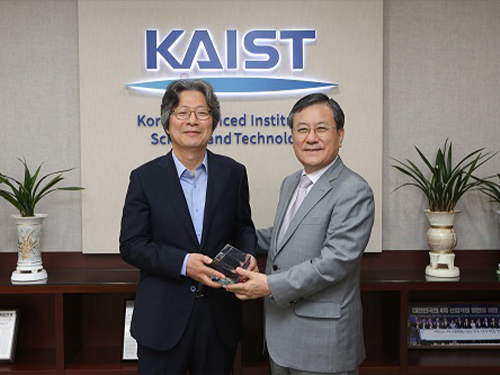 Distinguished Professor Koh Donates His Ho-Am Prize Money
(From left: Distinguished Professor Gou Young Koh and KAIST President Sung-Chul Shin)
Distinguished Professor Gou Young Koh from the Graduate School of Medical Science and Engineering donated one hundred million KRW to KAIST that he received for winning the Ho-Am Prize.
Professor Koh, who is widely renowned for angiogenesis, was appointed as the 2018 laureate of the 28th Ho-Am Prize for demonstrating the effective reduction of tumor progression and metastasis via tumor vessel normalization.
He made the donation to the Graduate School of Medical Science and Engineering, where he conducted his research. “As a basic medical scientist, it is my great honor to receive this prize for the recognition of my research outcome. I will give impetus to research for continuous development,” Professor Koh said.
Professor Koh also received the 5th Asan Award in Medicine in 2012 and the 7th Kyung-Ahm Award in 2011. He was also the awardee of the 17th Wunsch Medical Award. He has donated cash prizes to the school every time he is awarded.
KAIST President Sung-Chul Shin said, “I would like to express my gratitude to the professor for his generous donation to the school. It will be a great help fostering outstanding medical scientists.
Professor Koh received his MD-PhD from the Medical School of Chonbuk National University. After finishing his post-doctoral program at Cornell University and Indiana State University, he was appointed as a professor at Chonbuk National University and POSTECH. Currently, he holds the position of distinguished professor at KAIST and director of the IBS Center for Vascular Research.
2018.06.20 View 6073
Distinguished Professor Koh Donates His Ho-Am Prize Money
(From left: Distinguished Professor Gou Young Koh and KAIST President Sung-Chul Shin)
Distinguished Professor Gou Young Koh from the Graduate School of Medical Science and Engineering donated one hundred million KRW to KAIST that he received for winning the Ho-Am Prize.
Professor Koh, who is widely renowned for angiogenesis, was appointed as the 2018 laureate of the 28th Ho-Am Prize for demonstrating the effective reduction of tumor progression and metastasis via tumor vessel normalization.
He made the donation to the Graduate School of Medical Science and Engineering, where he conducted his research. “As a basic medical scientist, it is my great honor to receive this prize for the recognition of my research outcome. I will give impetus to research for continuous development,” Professor Koh said.
Professor Koh also received the 5th Asan Award in Medicine in 2012 and the 7th Kyung-Ahm Award in 2011. He was also the awardee of the 17th Wunsch Medical Award. He has donated cash prizes to the school every time he is awarded.
KAIST President Sung-Chul Shin said, “I would like to express my gratitude to the professor for his generous donation to the school. It will be a great help fostering outstanding medical scientists.
Professor Koh received his MD-PhD from the Medical School of Chonbuk National University. After finishing his post-doctoral program at Cornell University and Indiana State University, he was appointed as a professor at Chonbuk National University and POSTECH. Currently, he holds the position of distinguished professor at KAIST and director of the IBS Center for Vascular Research.
2018.06.20 View 6073 -
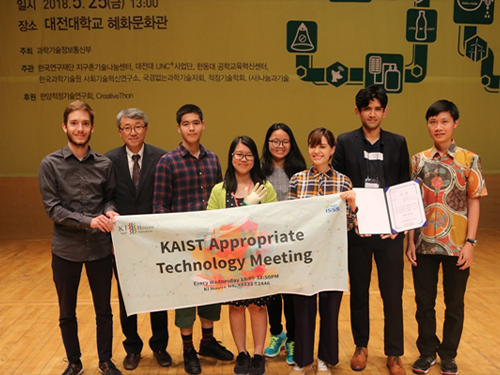 KAIST Team Reaching Out with Appropriate Technology
(The gold prize winning team of KATT)
The KAIST Appropriate Technology Team (KATT) consisting of international students at KAIST won the gold and silver prizes at ‘The 10th Creative Design Competition for the Other 90 Percent.’
More than 218 students from 50 teams nationwide participated in the competition hosted by the Ministry of Science and ICT last month.
The competition was created to discover appropriate technology and sustainable design items to enhance the quality of life for those with no or few accessible technologies.
A team led by Juan Luis Gonzalez Bello, graduate student from the School of Electrical Engineering received the gold prize for presenting a prosthetic arm. Their artificial arm was highly recognized for its affordability and good manageability. The team said that it cost less than 10 US dollars to construct from materials available in underprivileged regions and was easy to assemble.
Sophomore Hutomo Calvin from the Department of Materials Science & Engineering also worked on the prosthetic arm project with freshmen Bella Godiva, Stephanie Tan, and Koptieuov Yearbola.
Alexandra Tran, senior from the School of Electrical Engineering led the silver prize winning team. Her team developed a portable weather monitor, ‘Breathe Easy’. She worked with Alisher Tortay, senior from the School of Computing, Ashar Alam, senior from the Department of Mechanical Engineering, Bereket Eshete, junior from the School of Computing, and Marthens Hakzimana, sophomore from the Department of Mechanical Engineering.
This weather monitor is a low-cost but efficient air quality monitor. The team said it just cost less than seven US dollars to construct the monitor.KAIST students have now won the gold prize for two consecutive years.
2018.06.19 View 11974
KAIST Team Reaching Out with Appropriate Technology
(The gold prize winning team of KATT)
The KAIST Appropriate Technology Team (KATT) consisting of international students at KAIST won the gold and silver prizes at ‘The 10th Creative Design Competition for the Other 90 Percent.’
More than 218 students from 50 teams nationwide participated in the competition hosted by the Ministry of Science and ICT last month.
The competition was created to discover appropriate technology and sustainable design items to enhance the quality of life for those with no or few accessible technologies.
A team led by Juan Luis Gonzalez Bello, graduate student from the School of Electrical Engineering received the gold prize for presenting a prosthetic arm. Their artificial arm was highly recognized for its affordability and good manageability. The team said that it cost less than 10 US dollars to construct from materials available in underprivileged regions and was easy to assemble.
Sophomore Hutomo Calvin from the Department of Materials Science & Engineering also worked on the prosthetic arm project with freshmen Bella Godiva, Stephanie Tan, and Koptieuov Yearbola.
Alexandra Tran, senior from the School of Electrical Engineering led the silver prize winning team. Her team developed a portable weather monitor, ‘Breathe Easy’. She worked with Alisher Tortay, senior from the School of Computing, Ashar Alam, senior from the Department of Mechanical Engineering, Bereket Eshete, junior from the School of Computing, and Marthens Hakzimana, sophomore from the Department of Mechanical Engineering.
This weather monitor is a low-cost but efficient air quality monitor. The team said it just cost less than seven US dollars to construct the monitor.KAIST students have now won the gold prize for two consecutive years.
2018.06.19 View 11974 -
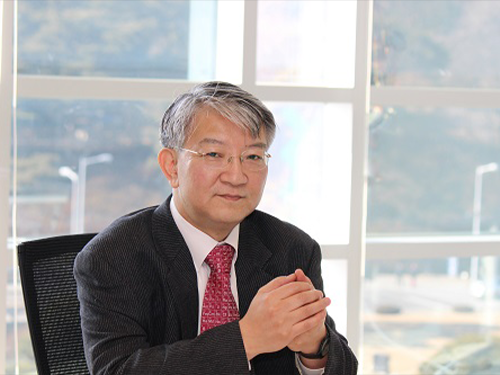 P.V. Danckwerts Memorial Lecture Awards Distinguished Professor Lee
(Distinguished Professor Sang Yup Lee)
Distinguished Professor Sang Yup Lee from the Department of Chemical and Biomolecular Engineering was selected as the awardee of the 2018 P.V. Danckwerts Memorial Lecture.
Professor Lee was named the recipient in recognition of his distinguished achievements developing innovative eco-friendly and sustainable chemical materials by applying metabolic engineering. The award is co-sponsored by the Chemical Engineering Science, the Institute of Chemical Engineers, the American Institute of Chemical Engineers, and the European Federation of Chemical Engineering.
The award ceremony and Professor Lee’s lecture will be held at the annual meeting of the American Institute of Chemical Engineers in October in Pittsburgh, PA in the US. He will give a lecture titled “Biotechnology to Help Achieve the UN’s Sustainable Development Goals.”
The P.V. Danckwerts Lecture was established in 1985 in honor of Professor Peter V. Danckwerts at the University of Cambridge who made significant contributions to the chemical engineering field. Professor Danckwerts served as executive editor of the Chemical Engineering Science and the president of the Institute of Chemical Engineers.
Professor Lee, currently the dean of KAIST Institutes, a multi-and interdisciplinary convergence research center, is taking the lead in biotechnology, especially in the field of metabolic engineering.
Professor Lee’s research team’s novel approaches have been gaining notable attention in the sustainable chemical engineering field and future health care innovations. His team recently presented research on drug-drug and drug-food interactions by using AI, a recombinant E.coli strain that biosynthesizes 60 different nanomaterials covering 35 elements on the periodic table, bio-degradable aromatic polymer’s enzyme production, and a molecular mechanism for PET degradation.
With this award, Professor Lee joined other prominent recipients including Dr. Neal Amundson at the University of Houston, the late Professor Octave Levenspiel at Oregon State University, and Professor Rutherford Aris at the University of Minnesota. Professor Lee is the second Asian recipient, following Dr. Mooson Kwauk at the Institute of Process Engineering of the Chinese Academy of Sciences who won the lecture award in 1989.
2018.06.18 View 6076
P.V. Danckwerts Memorial Lecture Awards Distinguished Professor Lee
(Distinguished Professor Sang Yup Lee)
Distinguished Professor Sang Yup Lee from the Department of Chemical and Biomolecular Engineering was selected as the awardee of the 2018 P.V. Danckwerts Memorial Lecture.
Professor Lee was named the recipient in recognition of his distinguished achievements developing innovative eco-friendly and sustainable chemical materials by applying metabolic engineering. The award is co-sponsored by the Chemical Engineering Science, the Institute of Chemical Engineers, the American Institute of Chemical Engineers, and the European Federation of Chemical Engineering.
The award ceremony and Professor Lee’s lecture will be held at the annual meeting of the American Institute of Chemical Engineers in October in Pittsburgh, PA in the US. He will give a lecture titled “Biotechnology to Help Achieve the UN’s Sustainable Development Goals.”
The P.V. Danckwerts Lecture was established in 1985 in honor of Professor Peter V. Danckwerts at the University of Cambridge who made significant contributions to the chemical engineering field. Professor Danckwerts served as executive editor of the Chemical Engineering Science and the president of the Institute of Chemical Engineers.
Professor Lee, currently the dean of KAIST Institutes, a multi-and interdisciplinary convergence research center, is taking the lead in biotechnology, especially in the field of metabolic engineering.
Professor Lee’s research team’s novel approaches have been gaining notable attention in the sustainable chemical engineering field and future health care innovations. His team recently presented research on drug-drug and drug-food interactions by using AI, a recombinant E.coli strain that biosynthesizes 60 different nanomaterials covering 35 elements on the periodic table, bio-degradable aromatic polymer’s enzyme production, and a molecular mechanism for PET degradation.
With this award, Professor Lee joined other prominent recipients including Dr. Neal Amundson at the University of Houston, the late Professor Octave Levenspiel at Oregon State University, and Professor Rutherford Aris at the University of Minnesota. Professor Lee is the second Asian recipient, following Dr. Mooson Kwauk at the Institute of Process Engineering of the Chinese Academy of Sciences who won the lecture award in 1989.
2018.06.18 View 6076 -
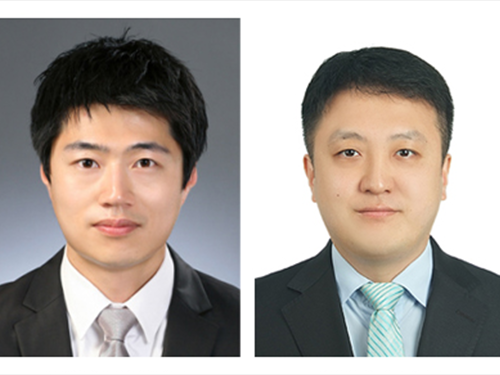 KAISTians Receive Future Ocean Science and Technology Awards
(From left: PhD candidates Minseok Kang and Junkeon Ahn)
PhD candidates Minseok Kang and Junkeon Ahn from the Department of Mechanical Engineering received Future Ocean Science and Technology Awards from the Korean Association of Ocean Science and Technology Societies (KAOSTS).
Since 2017, KAOSTS has conferred this award upon graduate students who have published outstanding papers on ocean science and technology in order to encourage young researchers in this area.
Kang published ‘Ship block assembly sequence planning considering productivity and welding deformation’ in Naval Architecture and Ocean Engineering in which he proposed an assembly sequence planning method for block assemblies that considers the geometric characteristics of blocks to determine feasible assembly sequences as well as assembly process and productivity factors.
Ahn published ‘Fuzzy-based FMEA of hybrid MCFC and gas turbine system for marine propulsion’ in Power Sources. In this research, he conducted a study proposing a fuzzy-based failure mode and effect analysis (FMEA) for a hybrid molten carbonate fuel cell and gas turbine system for liquefied hydrogen tankers.
2018.06.15 View 8403
KAISTians Receive Future Ocean Science and Technology Awards
(From left: PhD candidates Minseok Kang and Junkeon Ahn)
PhD candidates Minseok Kang and Junkeon Ahn from the Department of Mechanical Engineering received Future Ocean Science and Technology Awards from the Korean Association of Ocean Science and Technology Societies (KAOSTS).
Since 2017, KAOSTS has conferred this award upon graduate students who have published outstanding papers on ocean science and technology in order to encourage young researchers in this area.
Kang published ‘Ship block assembly sequence planning considering productivity and welding deformation’ in Naval Architecture and Ocean Engineering in which he proposed an assembly sequence planning method for block assemblies that considers the geometric characteristics of blocks to determine feasible assembly sequences as well as assembly process and productivity factors.
Ahn published ‘Fuzzy-based FMEA of hybrid MCFC and gas turbine system for marine propulsion’ in Power Sources. In this research, he conducted a study proposing a fuzzy-based failure mode and effect analysis (FMEA) for a hybrid molten carbonate fuel cell and gas turbine system for liquefied hydrogen tankers.
2018.06.15 View 8403